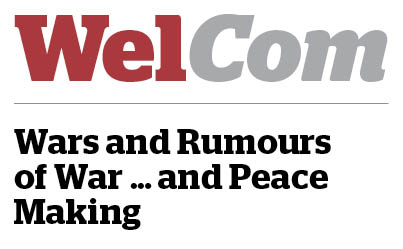August 2016
This is the first part of a three-section article in which Bishop Peter Cullinane explores the meaning of gradualness in working for peace.
At times, life seems like a tug-of-war between cruelties and atrocities over against goodness, grace and beauty, whether in nature or in human lives. I think the more we are touched by each, and by the conflict between them, the more deeply we live. After all, compassion (suffering-with) is a deep and rich way of being, but it wouldn’t be at all if there were no suffering. Reconciliation can be an enriching and moving experience, but it wouldn’t be if there were not first some kind of alienation. And I think our commitment to peace-making will be shallow if we haven’t first wept over the suffering, waste, futility and personal tragedies of war.
The tug-of-war is not an everlasting, unresolvable conflict. It reached a climax in the death and resurrection of Jesus, when evil was not merely defeated; it was itself transformed by being seconded to the purpose of revealing the resurrection and future life. Evil has no future.
St Paul spoke of creation ‘groaning in travail’ as the prelude to sharing re-birth. Perhaps he could have said ‘straining towards ecstasy’, for isn’t that what we catch glimpses of in bird-song and Beethoven, in self-sacrificing love, in forgiveness and new beginnings? The ecstasy doesn’t merely follow on from the agony; it emerges from within the depths of the agony, and gradually transforms it.
It is the meaning of ‘gradualness’ that I want to explore, because it calls for different ways of contributing to peace. Failure to recognise the implications of gradualness results in debates unhelpfully polarised between ‘war’ and ‘non-violence’, or results in mere repetition of the less sophisticated, more dialectic, wisdom of an earlier era: ‘… there is a time for killing, a time for healing; … a time for war, a time for peace …’ (Eccles. 3:2)
Pope Francis speaks of ‘time’ and the importance of process; Lonergan and others speak of shifting horizons, conversion and transformation when describing what happens to ourselves as we grow in knowledge; Pope John Paul II and moral theologians have spoken of ‘gradualness’ in the journey of personal development and moral growth. And if Jesus could speak of evils that ‘must happen’, this could only be because He did not expect the fullness of peace until the end of the ages: ‘You will hear of wars and rumours of war; do not be alarmed, this is something that must happen, but the end will not be yet’ (Mt 24:6ff). What is the meaning of peace-making in that context? It has many forms, and they all point to the end-time when peace will be God’s gift. The long wait serves to increase our longing and our capacity for it. It is also the only time available to us in which to become instruments of peace, which is at the core of every calling.
I confess to feeling weighed down by the terrible conflicts and cruelties depicted in documentaries on television’s History Channel and Al Jazeera. But I suspect the long-term cumulative effect of quicker communication and wider awareness of what is happening will be good. By uncovering skullduggery in any of its guises, good investigative journalism deserves recognition for its contribution to truth, justice and peace-making ‒ just as shonky journalism contributes to injustice and conflict.
When we look to the causes of the world’s conflicts, colonialism shows up as a prime culprit, both in its older form of ‘empire’, and in the still current ways that big-business, munitions dealers and financiers exploit and plunder, sometimes even with help from their home countries’ special forces. Moreover, the experience of being governed by outsiders, or by puppet dictators, did not help colonised people to gradually learn the skills and responsibilities of freedom. So, when liberated, many self-destructed from tribal rivalries or political corruption. Properly directed development aid to exploited or repressed peoples is not charity; it is owed as reparation, and as contributions to reconciliation and peace. And those who owe it are all who have benefited by the spoils of colonisation.
PJ Cullinane, June 2016.
